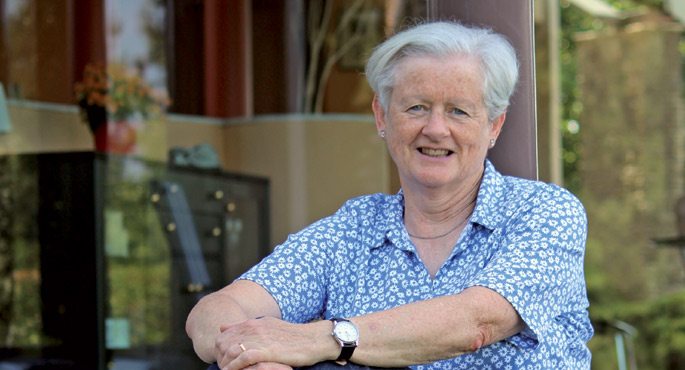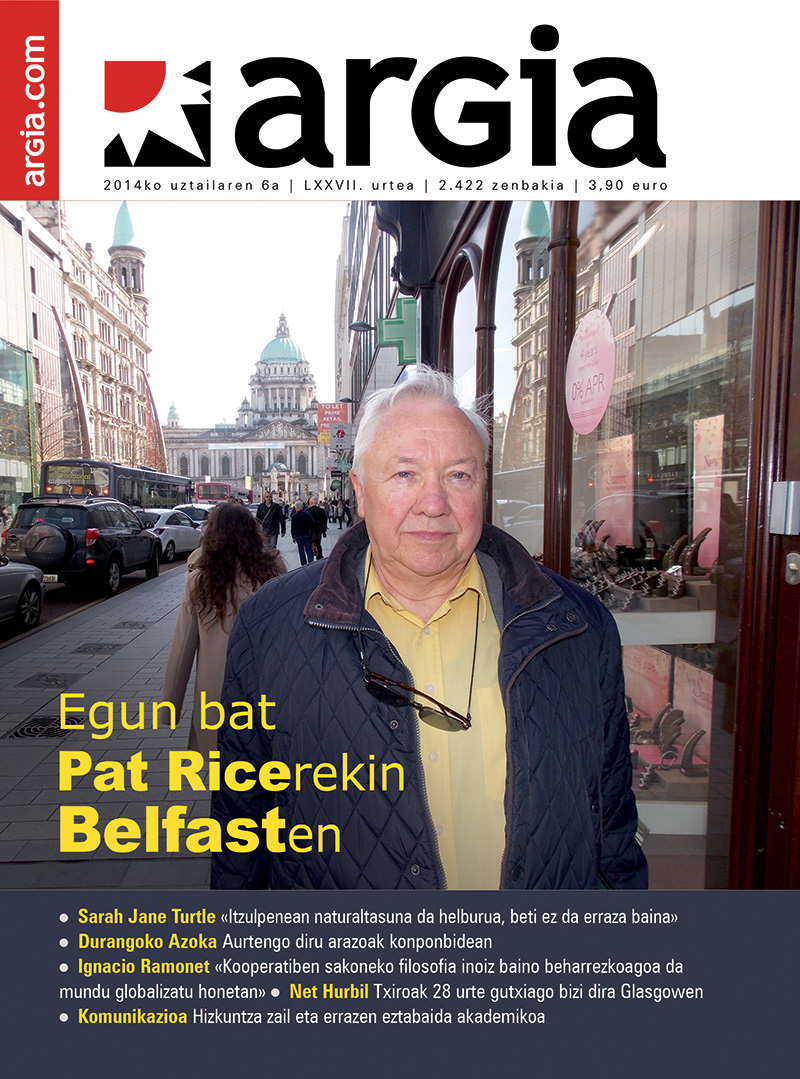"Euskal Herria would be a wonderful country if he were independent."
- The book has a tape. “Euskadi Prize 2013, Literary Translation to the Basque Country”. The book is The Adventures of Tom Sawyer, by Mark Twain. The translator is done by Iñaki Mendiguren and Sarah Jane Turtle. We approached Ezdox-Itsaso to ask the English woman.

What have I come for?
Yeah, I don't consider myself an interesting person, I'm a very normal man.
You have been awarded the Euskadi Award for Translation…
I just collaborated with Iñaki [Mendiguren Bereziartu]. In the same way that I helped him translate the books of Harry Potter. I helped him unlock some of the knots in English. As for the work of Tom Sawyer, winner of the last Euskadi Prize, it was a work on request. We get the message when we're in England, during Christmas parties, at my brother's house. The first thing we did was go to the village bookstore and we bought the book. I hadn't read it. When I was a kid, I had seen Tom Sawyer's story in the movies, I had heard him, I was familiar, but I hadn't read the full book. We read Charles Dickens, among others. In school, we had to read Dickens. I took Tom Sawyer, I read the first part, and I found it quite difficult.
Quite difficult...
It should be remembered that in 1876 Mark Twain wrote in the dialect of the United States area that in the book there is such a well-known view of the world, and this and that. I read the first part, though, and I started to enjoy it, to really enjoy it. And it's not just a book for young people. I liked it. I read the first chapter, and I didn't tell Iñaki that I found it a little difficult. So I encouraged him to say yes. This is how we accept the commission of the Galtzagorri Association. It's a pretty story, not just in the skin, but also in the depth. After reading me, Iñaki started reading the book and soon translated it. After translating a chapter, we stood next to each other and checked the one that had returned and unbuckled the curved knots. Or I would play the internet and start researching ...
Before the adventures of Tom Sawyer, they also translated into Harry Potter. Two truly different works.
You don't need to tell me. Harry Potter is a current story. Its difficulty is a rich dictionary, lots of announcements… A high level of English was needed to translate it. Iñaki was able to return him, he was the one who did the most important work, but always, always, joining us, especially on Sundays, and we released knots, verbal phrases and others. Anyway, as far as your question is concerned, there are two different papers: Tom Sawyer and Harry Potter, it's not comparable. Harry Potter is full of fantasy, magic… Tom Sawyer, on the contrary, focuses on that society of the time, in everyday life… In one and the other, the school has different meanings, the importance of the church, the way in which the children were treated…
At the Euskadi Literature Awards, you are the only one in English.
I really didn't look at it. “Unique”… let’s say I’m the first. I met Iñaki in Bilbao before I finished college. The university sent me to Aceros de Llodio to learn Spanish, but I lived in Bilbao and met Iñaki in a Protestant church in Bilbao. I did the final exam and I was lucky enough to surround the work in Bilbao, where Iñaki lived, studying history at the University of Deusto. It soon occurred to me that I was going to study in Basque. In Bilbao, I didn't need the Basque to communicate with people, but that was my wish. First of all, because Iñaki was Euskaldun, and his whole family, and, on the other hand, because Castilian was not in danger of disappearing, or thinking about it. Instead, there weren't so many people talking about Basque, and I wanted to be one more Basque speaker.
He arrived in Bilbao in 1975, the year marked. Franco's death.
I finished college, and I came. I'm already here. It was a very interesting time, if you will. High incidence. The changes happened quickly. On the other hand, demonstrations will be held every day of the week. You had to walk carefully. It wasn't England. I came from the southeast, a wonderful field, outside London… Bilbao was totally different, I adapted, but I also had difficulties: The Spanish state was not within the European Union and I had to ask for work and residence permits, and it was almost impossible to obtain them. The usual thing: “Here someone could do your job.” I was doing a great job of translation, of relationships, at a work agency. For the most part, he hired Basque and Galician sailors to work on ships with Liberia flags. All communication was in English, so they needed a person with a good level of English, especially for written relations. However, they told me that I would work a year, that they had to teach someone in the city to do that work. On the one hand, it's understandable, but on that occasion, we decided to marry. Ja, ja…
Ja, ja…
But that didn't help much either. I had to go to the police station, complete the documents and do the rest of my travels. Anyway, in 1976, we got married. I worked for five years in that office, and then we went to live in Mondragon, where Iñaki started working as a professor. By then I'd already taught English, I liked it, and so in 1980, I started being an English teacher. And I was a professor for twenty-two years in Arrasate.
Born in England, he came to Bilbao. Then you went to Mondragon, you've been in Ezdox-Itsaso for a long time... There's movement!
Of course, here don't move much. I've always been like this, we have such a capability. I have cousins premiums that I haven't seen in years and years, because people always come and go. I have a nephew who lives in Australia and marries one of them. I have not seen it for years, and who knows if I will see it again! I was born, as I said, in south-east England. As for college, I went north to study Basque Philology at the University of Bradford. It was, therefore, the bread of every day, to go from one side to the other. In my case, languages have been intermediate, I have been a translator and a professor, both in Bilbao and in Mondragón. Twelve years ago I decided to stop teaching, not to go and come from our house to Mondragon – nor did the road help – and Iñaki also told me: “Leave it, woman. Come home.” I didn't think twice. I decided, and I came home happy.
Swimming among the languages…
Always swimming between languages... The only language I speak well is English. Moreover, I am trying to improve my Basque country. Your pronunciation is not very good. Among the people in Euskera, I feel like an exotic flower. Yes, you look at me, you hear me, you know I'm not from here, you ask me where I am from: “From England,” and you are surprised, it seems to me that I have come from another planet. At the same time, the people here support me more easily. Especially because I speak in Basque. It is certainly a great advantage. “This woman has made an effort to learn how to speak in Basque,” they say, or think. On the other hand, you see that many people, many of them, have not made that effort. I do. That is what I am about. I also have ease in learning languages. I have always insisted on that. In school, I studied French, Latin and German, and in college, the languages of philology were German and Spanish. As for the Basque country, I had a professor at home. For six months I only went to study in Basque, when it was in Arrasate. I had to learn vocabulary, work grammar… One day I decided to get a degree to teach English, so I took the sabbatical year and went to London. That year, in addition to getting that document, I also went to Basque classes in Arrasate. Great! For the rest, I have learned Basque almost without realizing it. When we met, Iñaki and I spoke in Spanish. Gradually, as I learned words and phrases in Basque, I began to use them. I started to say in Basque simple things that I could say in Basque. Others, in Spanish or English. And without realizing it, Iñaki and I were using less and less Spanish, and more and more Euskera. There was a time when it was absolutely normal to speak Spanish among us. Today, it is more normal to speak in English than in Spanish. Anyway, we speak in Basque. In that sense, I have been very lucky.
The Basque is easy, the Basque is difficult… What do you say?
Difficult. Learning grammar is very difficult. In the case of English, dictionary and pronunciation are difficulties. On the contrary, the whole structure of the Basque Country is totally different. It doesn't look like another. I learned German and Spanish without too many difficulties. But does Euskera? It's the hardest language I've ever had. I also find it difficult to understand the different dialects, although this is a matter of practice, to talk to people… On the other hand, a few years ago, when I left the teaching and began to translate it, I had the opportunity to translate it from Euskera to English, for Euskaldunon Egunkaria. It was lucky. We stopped lecturing and explained the paper's work. Excellent! Of course, we did several tests, we talked to Martxelo [Otamendi]… Each day we translated three Basque news into English, for the edition of Egunkaria on the Internet. But unfortunately, it was closed. However, I then stayed in Berria for several years, until it was also suspended for economic reasons.
You came back with two heads.
I translated the text. Then Iñaki looked to see if he had understood the text correctly. He then reworked it in order to improve in English. In fact, when you read, you don't have to give the translation, it has to seem like this, it's original. That's what I was taught in college, that's what you have to try to get, that the text is as natural as possible. This requires experience. Now, when I have to come back, I read the text and accept the main idea. I must be certain that I have understood nothing wrong. When I take the text, I try to be as natural as possible. I mean, I make short sentences, change of order -- anything I can think of. The goal is naturalness, but it's not always easy.
There has long been no Euskaldunon Egunkaria…
It's not there, it's not there. They closed it. It was hypocrisy. Close a newspaper like this! There was no reason for this. The locals were made prisoners! Was there any evidence? They seemed to have guessed them. I became angry. “But what is this? I don't want to be here, it's horrible!"
Could this happen in England?
Close a newspaper? No, no, no… Last year, the newspaper The Guardian published a series of information about the National Security Agency NSA that Edward Snowden announced. That gave more of a headache to the newspaper, the director was called to testify to parliament and he and he, but did the newspaper close? I didn't think of it.
What image does it have of the Basque Country? What do you think of this people?
This is Euskal Herria, I've always thought so. A year ago, someone told me to speak in Spanish: “Live in Spain!”… [Makes a surprise gesture] No, this is different. For example, a Welsh, or a Scottish, you cannot say that you are English, that you live in England. You have to use the “United Kingdom”. I have a Welsh friend. He doesn't speak Welsh, but he's Welsh and British. I am English and British. He has asked me about the Basque Country, and I think that much of the history of this country is very sad. Above all, the era after the Spanish Civil War. It seems to me to be a great tragedy. Even in times of war, they had to adapt the fishing boats to be war! Very sad. The lehendakari has to go into exile, the Franco regime… The devil’s regime! I think it would be a wonderful country if it were independent. Maybe.
That is it!
Here's Iceland, a small, independent country, and they don't go wrong. Or Scotland, they have the independence at their fingertips. Even if it wins the yes in the referendum, the monarchy will be maintained, and the liberal, because nobody wants the euro, because nobody wants it. I believe that, at the moment, 46% of the Scots are in favour of independence. They're emotionally on their side. Practically, I don't know, I'm not sure. I'll be surprised if I win the yes, but if I win, all right, go ahead!
Sarah Jane Turtle (1952, Croydon, Ingalaterra). Aleman eta Espainierazko Filologia ditu unibertsitate ikasketak. 1975ean heldu zen Euskal Herrira. Bilbon ezagutu zuen gaur egun senar duen Iñaki Mendiguren Bereziartu itzultzaile zaildua. Adrian Zelaiak ezkondu zituen, zibiletik, 1976ko urriaren 30ean. Biharamunean, elizaz ezkondu ziren eliza protestante batean, erreforma protestantearen egunean. Bilbon eta Arrasaten bizi izan ziren, Ezkio-Itsason baino lehen. Ingeles irakasle jardun zuen hainbat urtez, baina itzultzaile ari da aspaldi. Senarrak itzuliak dituen Harry Potterren liburuen atzean da Turtle, eta haren ondo-ondoan, berriz, Tom Sawyer-en abenturak lan sarituan. Itzultzaile da, baina auzoko zenbait gazteri ingelesa ikasten laguntzen ere ari da, urririk.
“Pena da hainbeste jendek euskaraz ez hitz egitea. Gazte askok hitz egin dezake, baina ez dute egiten. Lan handia egin da hezkuntza sistemaren bidez. Baina… Jendea hasten denean esaten: ‘Ezin duzu inor behartu euskaraz hitz egitera’. Tira, eta non hitz egin behar du, bada, Euskal Herrian ez bada? Non erabili behar du? Jendea bultzatu behar da, hitz egin dezan, erabil dezan. Ez dakit, hala ere, etorkizuna distiratsu datorren. Nik, ahal dudan guztietan hitz egiten dut euskaraz”.
“Hor ikusten ditut gurasoak, estresatuta, umeek ingelesa ikas dezaten. Lasaitu egin beharko lukete, presarik ez izan. Garaia heltzen denean, ikasiko dute, ikasi behar baldin badute: joango dira ingelesez hitz egiten den herrialde batera, edo igaroko dute ikasturtea atzerrian”.
“Hemen, ikasleak, Haur Hezkuntzan bertan hasten dira ingelesa ikasten. Lehen Hezkuntzara heldu eta ez dakite askorik. Ahoskera on xamarra dute, baina ez dira esaldi bat osatzeko gai. Bigarren Hezkuntzara heldu eta bestelako koxka bat dute: gramatika ikasi behar dute, hizkuntza bera. Beste maila bat da hori. Orduan, ahal duenak eskolaz kanpo ere ikasi behar izaten du ingelesa. Eskolan ikasten dutena ez da nahikoa eskolako planak eskatzen duena betetzeko ere! Nola moldatu behar dute?”.
Gozamen aparta bezain deskribatzeko zaila dakar, norbaiten hitzak irakurri edo entzun ostean, zera pentsatzeak: “Horixe zen neu aurreko hartan azaltzen saiatu nintzena!”. Idazlea eta itzultzailea da María Reimóndez, eta galegoz aritzen da, hizkuntza... [+]
Anton Txekhov, Raymond Carver eta Alice Munroren ipuingintzari buruzko mahai-ingurua egin dute Iker Sancho, Harkaitz Cano eta Isabel Etxeberria idazle eta itzultzaileek, Ignacio Aldecoa zenaren ipuin literarioaren jaialdian, Gasteizen. Beñat Sarasolak gidatuta, autore... [+]
I have experienced two very different linguistic experiences in two southern peoples in recent weeks. One at a conference organized by a public institution of a Basque people and another at a school assembly. If we were at the conference more than 80 people, I would say that 90%... [+]
Ekain honetan hamar urte bete ditu Pasazaite argitaletxeak. Nazioarteko literatura euskarara ekartzen espezializatu den proiektuak urteurren hori baliatu du ateak itxiko dituela iragartzeko.

























